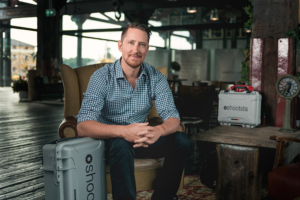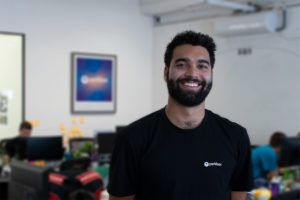As many businesses continue to struggle to navigate their way through the pandemic, we spoke with nine Australian startup leaders to understand what they’ve learned from the COVID-19 catastrophe and how they believe businesses can keep their heads above water in future crises.
Here’s their advice

Employment Hero CEO Ben Thompson. Photo: supplied
Ben Thompson
CEO and co-founder, Employment Hero
Taking decisive action is always better than doing nothing. As a leader, don’t allow yourself to become paralysed by uncertainty.
Be empathic, authentic and purposeful in your decision making by balancing strong leadership with vulnerability.
During tough times, teams will appreciate seeing your human side.
You won’t get through a crisis if you’re operating on auto-pilot – be prepared to land at multiple destinations with a moment’s notice, use real-time controls, continually track against live forecasts and keep your fingers on every dial.
Andrew White
ANZ Country Manager, Signavio
Perhaps the most important way to stay afloat while adapting to this new way of working is to implement better processes.
We are witnessing first-hand that businesses that have done previous work on understanding, improving and transforming their business processes have been better placed to avoid or ameliorate the negative impact caused by the COVID-19 crisis.
Thus, if COVID-19 has taught businesses anything, it is that viewing process or operations management as a ‘nice to have’ is essentially undermining their organisation. Process management has surfaced as a business-critical function that allows companies to navigate unexpected events and crisis situations much more effectively- particularly at a time, where changes are accelerating on a daily basis.

Clipchamp CEO and co-founder Alex Dreiling. Source: supplied
Alex Dreiling
CEO and co-founder, Clipchamp
When the COVID-19 crisis started, we learned two things quickly: people around the world needed solutions like ours, and a lot of team members were worried about using public transport on their way to work. Those two learnings made decisions easy.
On March 16, before the COVID-19 peak in Australia, we started working from home. We also let the team know that everyone’s position is safe and that we will continue to hire and execute our ambitious plan.
Over the past few weeks, we have all been witnessing incredible suffering around the world.
As a result, it’s easy to get trapped in a cycle of negativity. It was important for us not to go down that path. We chose to pay attention to all the positive aspects we were seeing, and we chose to keep pushing and delivering our platform to market.
This focus really helped us to stay sane in times of radical change.
Kim Teo
CEO, Mr Yum
That humans are incredible at rolling with the punches. In times of crisis, an adaptable team is the most valuable assets a business can have!
What we’ve learnt for future crisis is to work closely with the people in your industry and listen to what they need.
Pre-coronavirus shutdown, our business was growing fast with dine-in ordering, but from 23 March when all food and bev businesses were forced to close, our business stopped.
We saw that hospitality needed to pivot and so working with venue owners we added pick-up and delivery to our platform and went live just two days after the shut-down.
As things return industry is continuing to face limited dine-in capacity and will need to continue doing pickup & delivery to make the numbers work.
We’re now able to provide a safe platform for people to order and pay from their own devices, while our omni-channel online ordering platform will allow food and beverage businesses to have table ordering, pickup and delivery all on one simple website.

Tim Dickinson, GM at Assembly Payments.
Tim Dickinson
General manager, Assembly Payments
COVID-19 has really underscored the importance of being flexible when building a business. You can’t predict or prepare for this kind of event. You plan as if they aren’t going to happen, but everything goes out the window when they do.
If 2020 went to plan, I’d be living in Singapore right now. We would be midway through a broad globalisation strategy as part of our JV with Standard Chartered. Assembly is still growing, but we’ve doubled down on local partnerships and payment innovations. We’ve been able to do that by simply calling and talking to our customers. It’s such simple advice, but listening to your clients can be so valuable when times are tough.
This period has also reinforced what values we should be looking for in future hires. Autonomy and ability to work remotely as part of a team have climbed right up the list. I can’t speak highly enough of our team who have really pulled together and managed to get more done without the need for an office or granular management style. We’ve also grown as a company. Nobody should feel coy about school runs or bad internet ruining someone’s day. I fully trust the team, and I think more companies will take the same approach going forward.
I think most businesses will have seen the value of both lessons over this period. That, in itself, will soften the blow of future crises. COVID-19 has battle-tested our startup industry and that should make it more appealing for investment from abroad down the line. While many have suffered, there’s a number that are quietly still growing their business — albeit slower than expected — and that’s worth celebrating.
Caroline Lepron
Founder, Skoutli
I have learnt that it doesn’t matter how much prepared you can be as a founder. Even with the best website and the best strategy when a crisis like this hit, there was nothing that we could do to generate revenue for more than 2 months.
So, we’ve learnt to look differently at our business and as an early stage company are lucky to be able to be very lean with our expenses. As the people with the most invested, founders are the first to bear the cuts either directly or indirectly.
We have also been able to reduce our biggest expenses such as office space by putting them on hold and focusing on what we could control, like developing our new website, rethinking about our 6 month and 12 month plans. It was good for us to take a step back and think about our overall strategy.

Shootsta’s Mike Pritchett
Mike Pritchett
Founder and CEO, Shootsta
One thing I noticed is that this period rewarded decisive thinking. Those that made tough decisions early are now better off. For us, there were two tough decisions. Firstly, to bring forward a strategic pivot that we were going to make over the course of a year and execute it in a month. Also, at the same time, reduce staff hours globally and save as many jobs as possible.
These are both heavy decisions that CEOs typically agonise over. I essentially asked the team to do more with less — which is normal for startups. But, I asked this during a period of intense stress and difficulty both in and out of the workplace.
They all rose to the challenge and vastly exceeded my expectations. Shootsta is better for it. A month of pain put us back on a trajectory for growth. We’ve also reinstated all of the hours we reduced. While we’re not through this yet, we are cautiously optimistic.
I’m not alone in making tough calls during COVID-19. But I think this event we see all executives act a bit faster on decisions going forward. Will this lead to more mistakes? Perhaps. But being fast and flexible helped us weather this pandemic to date, and it’s an approach we’ll take into the future.

Ben Leeds, Perkbox Australia country manager.
Ben Leeds
Country manager, Perkbox Australia
We practice what we preach at Perkbox, so COVID-19 forced us to ask how companies can promote workplace culture without an office. This led us to hold daily exercise challenges, birthday parties and other events over Zoom. It also led to a realisation that many of the perks on our platform are aimed at rewarding office workers, so we quickly rearranged this to feature benefits that can be accessed by remote workers.
Culture can easily fall onto the backburner when you operate as a remote workforce or when your company is under financial strain. I wouldn’t be surprised if COVID-19 led many managers to cut their culture budget altogether. But I’d argue that in these difficult times, workplace culture is more important than ever before.
For us, even something as cheap and as simple as a daily exercise challenge did wonders for the team’s morale, helping us stick together and be more productive over the past few months.

Carolyn Breeze
Carolyn Breeze
General manager, GoCardless
We have found that many businesses are revisiting the technology, systems and processes they have in place to consolidate and drive efficiency. This is not only related to consolidating costs during tough times but also ensuring they have the right building blocks in place to support growth as business scales again post COVID-19.
I have seen so many pivots and business opportunities throughout COVID-19. Businesses that remained agile, reduced unnecessary operational costs, adopted new ways of working and reaching customers, thrived – proving just how resilient we can all be. I am proud of the changes we made. Even if business returns to normal soon, we will keep many of these measures in place.
Another key learning that has come out of COVID-19 is that businesses need flexibility in their offerings – a way to retain customers so they can pause with you if needed, as opposed to cancelling or leaving you as a customer altogether. I believe coming out of COVID-19, consumers and businesses alike will be looking for flexible vendors that allow them to only pay for what they consume/use.”




















Trending
Daily startup news and insights, delivered to your inbox.